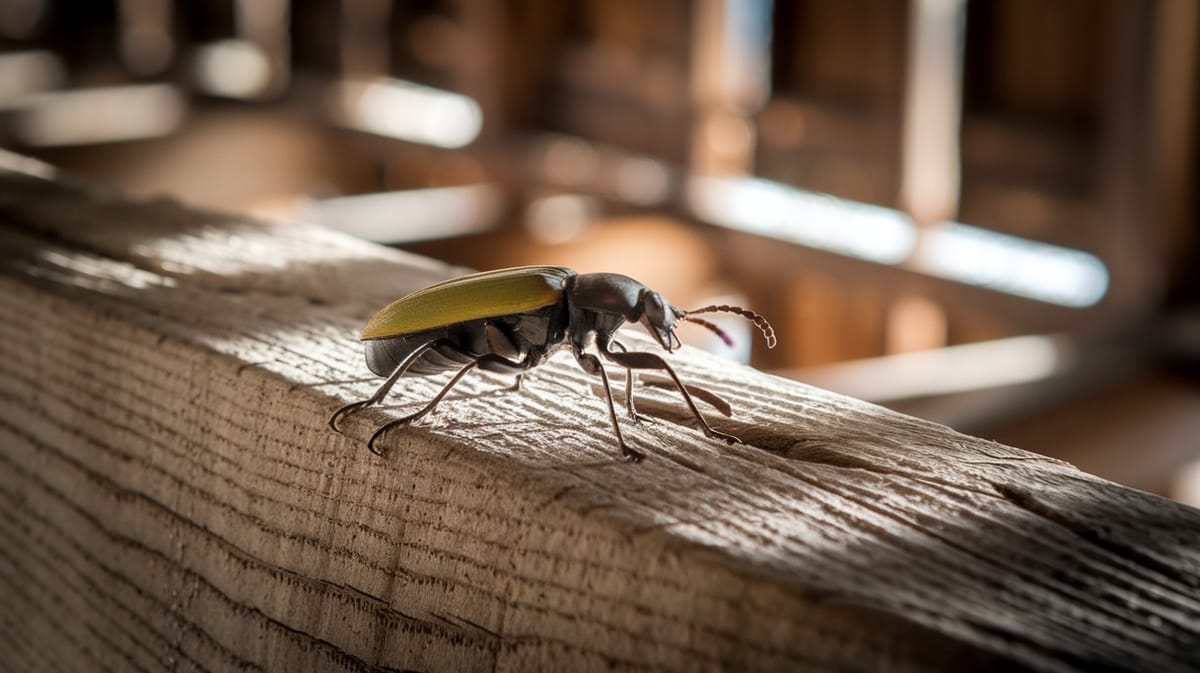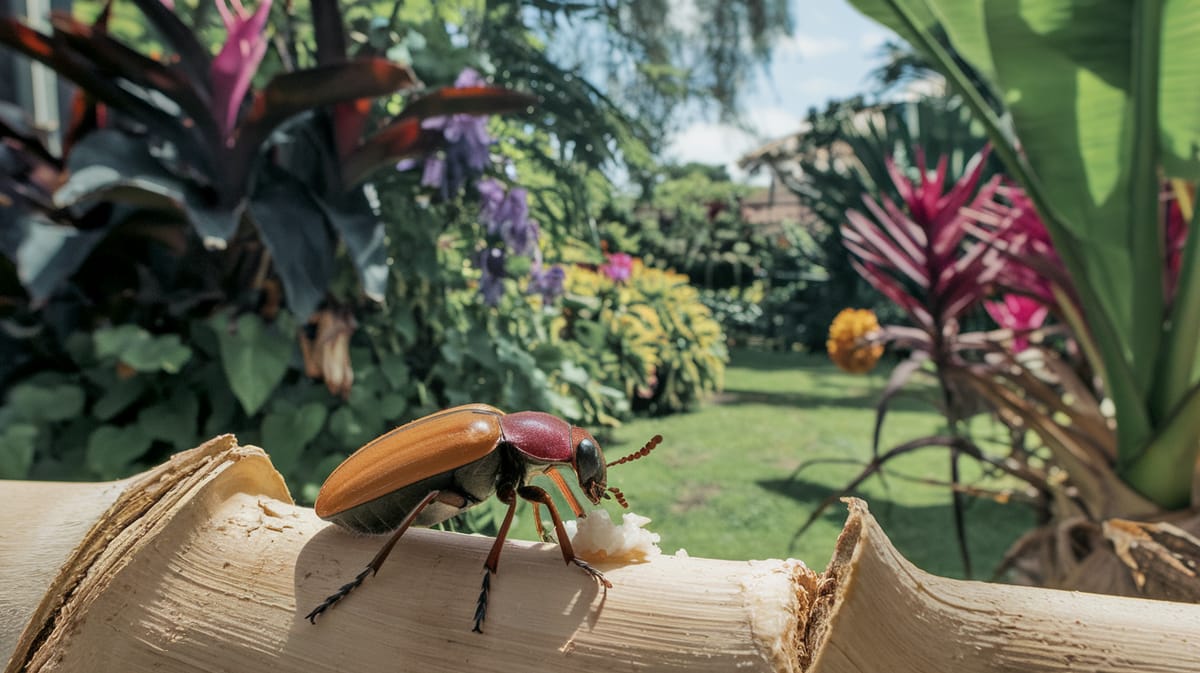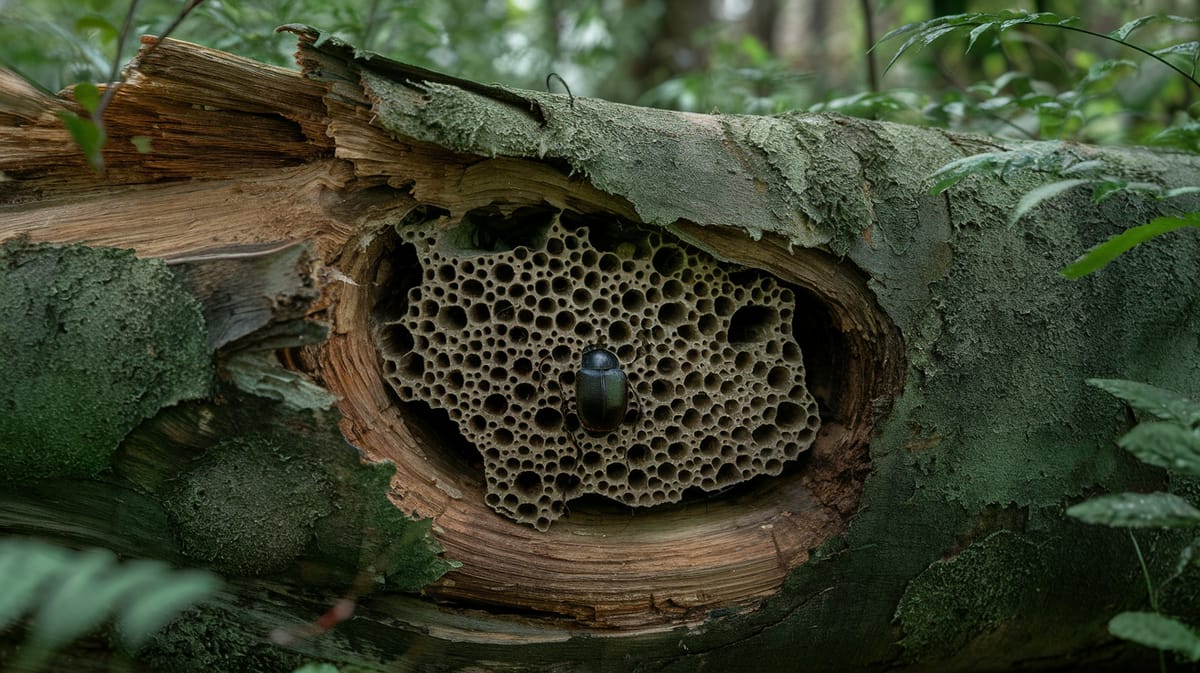Powderpost Beetles
Masters of wood transformation, Powderpost Beetles bore through timber, leaving behind a maze of tunnels and fine powder. Vital decomposers, they recycle nutrients back into the ecosystem.

Key Insights at a Glance
Did You Know?
Taxonomy & Classification
Powderpost Beetles are specialized wood decomposers, adept at breaking down cellulose with their unique larvae. They thrive in diverse climates, showcasing their adaptability. Let's understand the evolutionary journey and classification of these remarkable decomposers.
Global Presence
Powderpost Beetles span over 70 species in the Lyctus genus, primarily found in tropical and subtropical regions worldwide.
Evolutionary Resilience
Originating in the Cretaceous period, these beetles have adapted over millions of years, surviving major climate shifts with their wood-boring abilities.
Lifecycle and Growth
A remarkable journey of transformation from Egg to Adult.
Egg
Female beetles lay eggs in wood cracks, where they remain protected until hatching into larvae.
Larva
Larvae tunnel through wood, feeding on starches, creating characteristic powdery frass as they grow.
Pupa
Inside a cocoon-like case within the wood, larvae transform into pupae, preparing for adulthood.
Adult
Adults emerge to mate and lay eggs, continuing the cycle, often seen near wood surfaces.
Dietary Habits
A wood-destroying insect, this beetle bores into seasoned timber, feeding primarily on starch-rich wood grains and cellulose.
| DIET TYPE | DESCRIPTION |
|---|---|
| Primary Diet | Primarily consumes starch-rich hardwoods like oak, ash, and mahogany, boring holes to access the nutrient-rich interior. |
| Secondary Diet | Occasionally feeds on softwoods if hardwoods are scarce, though less preferred due to lower nutrient content. |
| Occasional | Rarely targets processed wooden objects, exploiting structural vulnerabilities when natural wood sources are unavailable. |

Behaviour and Adaptations
Discover the fascinating adaptations of Powderpost Beetles that ensure their survival and success.
Wood Boring Efficiency
Perfectly adapted to bore into wood, aiding in nutrient absorption and reproduction.
Secretive Lifestyles
Lives within wooden structures, evading predators and harsh environments.
Egg Laying Precision
Lays eggs in cracks of unfinished wood for optimal larval development.
Ecosystem Impact
Powderpost Beetles play a crucial role in recycling nutrients and enhancing biodiversity.
Wood Decomposer
Breaks down dead wood, returning nutrients to the soil.
Biodiversity Promoter
Supports ecosystem diversity by creating habitats for other organisms.
Nutrient Cycler
Facilitates nutrient cycling through decomposition, enriching soil quality.
Conservation Challenges
Addressing significant threats specific to Powderpost Beetles conservation.
Habitat Destruction
Deforestation and urbanization reduce the availability of suitable habitats for these beetles.
Chemical Exposure
Pesticides and wood treatments negatively affect beetle populations.
Climate Change
Altered temperatures disrupt breeding and survival of beetles.
Frequently Asked Questions
How long do Powderpost Beetles live?
Powderpost beetles typically live for 1 to 5 years, depending on environmental conditions and the availability of food sources. The adult stage is relatively short, often just a few weeks, as their primary role is to reproduce and lay eggs.
What do Powderpost Beetles eat?
Powderpost beetles feed on the starches and sugars found in hardwoods. They prefer seasoned wood and can infest furniture, flooring, and other wooden structures. The larvae tunnel through the wood, creating damage as they consume the cellulose and other nutrients.
Are Powderpost Beetles poisonous?
No, powderpost beetles are not poisonous. They do not pose a direct threat to humans or pets through toxins. Their primary impact is structural damage to wood, which can be extensive if infestations are left untreated.
Are Powderpost Beetles endangered?
Powderpost beetles are not considered endangered. They are common in many parts of the world and are known for their ability to infest and damage wooden structures. Effective management and treatment strategies help control their populations in infested areas.
What do Powderpost Beetles symbolize?
Powderpost beetles are often associated with decay and deterioration due to their wood-destroying habits. While not commonly linked to cultural or symbolic meanings, they can represent the hidden dangers of neglecting wood preservation and maintenance.
Do Powderpost Beetles bite?
Powderpost beetles do not bite humans or animals. Their mouthparts are adapted for feeding on wood, and they are not aggressive towards people. Their presence is a concern due to the damage they cause to wooden structures.
What color are Powderpost Beetles?
Powderpost beetles are typically reddish-brown to dark brown or black. Their coloration can vary slightly depending on the species and age. This coloring helps them blend in with the wood they infest, making them hard to spot.
Does a Powderpost Beetles have wings?
Yes, adult powderpost beetles have wings. They are capable of flight, which allows them to disperse and find new wood sources for laying eggs. Despite their ability to fly, they are often found near the wood they infest.
What does a Powderpost Beetles look like?
Powderpost beetles are small, usually between 1/8 to 1/4 inch long. They have elongated, cylindrical bodies with six legs and a pair of antennae. Their bodies are hard, and they have a distinct head and thorax, making them well-suited for burrowing into wood.
Is a Powderpost Beetles an insect?
Yes, powderpost beetles are insects. They belong to the order Coleoptera, which includes beetles. As insects, they have three main body parts: head, thorax, and abdomen, along with six legs and a pair of antennae. They undergo complete metamorphosis with distinct larval, pupal, and adult stages.
Related Insects
Discover insects with similar characteristics to Powderpost Beetles - including shared habitats, diets, and taxonomic classifications
Share this profile
Help others discover Powderpost Beetles
